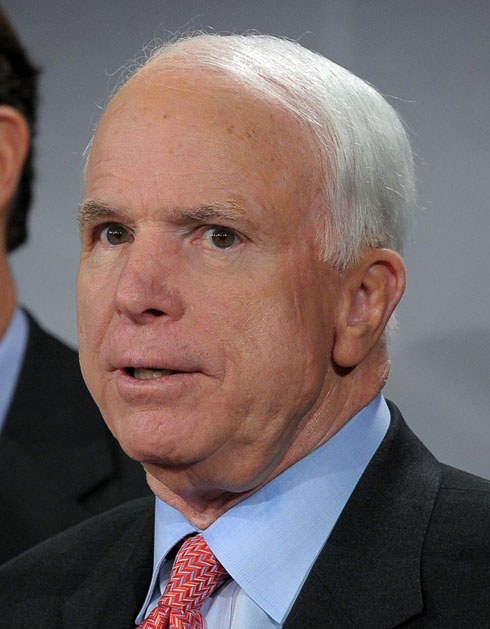It’s no secret that in seeking to fend off a conservative primary challenger, Sen. John McCain (R-AZ) has been scrambling to his right faster than you can say “cap-and-trade.” But now, in a bid to explain his vote for the bailout, the Arizona senator is flat out rewriting history.
McCain said recently that he only voted for the $700 billion package because Henry Paulson and Ben Bernanke misled him, by assuring him it would focus on the housing meltdown, rather than on Wall Street. But that appears to be directly contradicted by the record.
McCain sat down recently with the Arizona Republic editorial board. Reports the paper:
[T]he four-term senator says he was misled by then-Treasury Secretary Henry Paulson and Federal Reserve Chairman Ben Bernanke. McCain said the pair assured him that the $700 billion Troubled Asset Relief Program would focus on what was seen as the cause of the financial crisis, the housing meltdown.
“Obviously, that didn’t happen,” McCain said … “They decided to stabilize the Wall Street institutions, bail out (insurance giant) AIG, bail out Chrysler, bail out General Motors … What they figured was that if they stabilized Wall Street — I guess it was trickle-down economics — that therefore Main Street would be fine.”
It’s true that the AIG, Chrysler, and G.M. bailouts weren’t part of the original TARP legislation. But everyone understood that TARP was focused on stabilizing Wall Street, in order to prevent a collapse of the financial system, not directly on the housing market. Including John McCain.
Here’s how McCain explained the bailout plan in a September 22, 2008 interview: “‘We’re going to take over these bad loans. And we’re going to have the taxpayer help you out. But when the time comes and the economy recovers, then anything that’s gained back is going to go to the taxpayers first.” As the Chicago Sun-Times explained in reporting McCain’s comments: “The plan would dole out huge sums of money to financial firms to purchase bad mortgage-backed securities so the firms can resume normal lending operations.”
In a speech the following day about improvements he was seeking to what became the TARP legislation, McCain made clear that he knew the measure was targeted at Wall Street, declaring: “No Wall Street executives should profit from taxpayer dollars … The senior leaders of any firm that is bailed out should not be making more than the highest paid government official.”
And in a speech the following week, McCain added: “We cannot dedicate more than a trillion dollars to rescue failing institutions, and then go right back to business as usual in Washington.” Which failing institutions was he referring to, if not the banks?
McCain’s effort during his Arizona Republic interview to distance himself from the bailout didn’t stop there. He also appears to have presented his decision to return to Washington as being prompted in part by a phone call from President Bush.
The paper reported:
McCain said Bush called him in off the campaign trail, saying a worldwide economic catastrophe was imminent and that he needed his help. “I don’t know of any American, when the president of the United States calls you and tells you something like that, who wouldn’t respond,” McCain said. “And I came back and tried to sit down and work with Republicans and say, ‘What can we do?’ “
The idea that Bush “called [McCain] in off the campaign trail” is also contradicted by the record, which clearly shows that McCain himself voluntarily chose to suspend his campaign.
Brooke Buchanan, a spokeswoman for McCain, acknowledged as much to TPMmuckraker, and said the Republic had mischaracterized McCain’s comments in the interview. She said that McCain had in fact told the Republic only that President Bush had called McCain while the senator was campaigning, to inform him about the crisis — not that Bush had “called him in off the campaign trail.”






